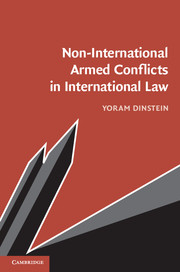Book contents
- Frontmatter
- Contents
- Preface
- Table of cases
- Table of treaties
- Table of Security Council resolutions
- Table of General Assembly resolutions
- Abbreviations
- 1 The framework
- 2 The preconditions of a NIAC
- 3 Thresholds and interaction of armed conflicts
- 4 Insurgent armed groups and individuals
- 5 Foreign intervention in a NIAC
- 6 Recognition
- 7 State responsibility
- 8 The principal LONIAC treaty provisions
- 9 Additional treaty texts
- 10 NIAC war crimes
- 11 LONIAC customary international law
- 12 LONIAC and human rights law
- Conclusions
- Index of persons
- Index of subjects
- References
6 - Recognition
Published online by Cambridge University Press: 05 September 2014
- Frontmatter
- Contents
- Preface
- Table of cases
- Table of treaties
- Table of Security Council resolutions
- Table of General Assembly resolutions
- Abbreviations
- 1 The framework
- 2 The preconditions of a NIAC
- 3 Thresholds and interaction of armed conflicts
- 4 Insurgent armed groups and individuals
- 5 Foreign intervention in a NIAC
- 6 Recognition
- 7 State responsibility
- 8 The principal LONIAC treaty provisions
- 9 Additional treaty texts
- 10 NIAC war crimes
- 11 LONIAC customary international law
- 12 LONIAC and human rights law
- Conclusions
- Index of persons
- Index of subjects
- References
Summary
Conditions for the existence of a State and a Government
Every State must have a Government. Possessing a Government is one of four conditions requisite of statehood, conjointly with (i) territory, (ii) nation, i.e. population, and (iii) sovereignty, viz. independence. ‘[T]he existence of an effective and independent government is the essence of statehood’. The Government is the instrumentality through which the State – a legal personality – acts and functions (both internally and externally), exercising its rights and discharging its duties.
The powers of governance in a State are usually divided between a central authority – with jurisdiction over the entire national territory – and multiple regional (in a federal State, provincial-cantonal) as well as local authorities vested with competence within prescribed areas. Whichever way powers are allocated, the Government of a State (in the comprehensive sense of the term) must fulfil two cumulative conditions under international law: (i) independence from any other Government; and (ii) effective control over the State's territory.
- Type
- Chapter
- Information
- Non-International Armed Conflicts in International Law , pp. 95 - 114Publisher: Cambridge University PressPrint publication year: 2014

